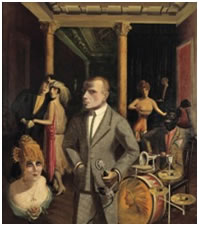CGS Workshop – Roundtable

Weimar and Beyond – Radicalism, Contingency and Desire
Manuela Achilles
Political Passion and the Law: Constitutional Patriotism in the Weimar Republic
Laura Julia Heins
Physiognomic Utopias: Béla Balázs's Weimar Film Theory
Gabriele Dietze
Sexual Modernism and Madness: The Figure of the Crazy Woman in Weimar Urban Bohème
This workshop explored emergent discourses and practices in the political, habitual and aesthetic fields that were cut off by National Socialism and reemerged in the postwar Germanies in different contexts and forms. Each paper tackled phenomena being radical at their appearance and being concerned with national community, international socialism, or sexual fulfillment.
Manuela Achilles (German and History, UVa) excavated and reclaimed sites of democratic desire and fantasy that emerged and developed with the fledgling Weimar Republic. Taking the ideal-typical distinction between civic and ethnic nationalism as her vantage point, Achilles argued that Weimar republicans promoted a constitutional patriotism of the middle-ground that prefigured the Grundgesetz-patriotism of the Federal Republic. Laura Heins (German and Media Studies, UVa) investigated the concept of cinematic realism of the Hungarian-born script writer and film critic Béla Balázs. Relating Balázs' intense concern with facial expression to his collaboration with Leni Riefenstahl on The Blue Light in 1932, Heins interrogated the distinctions between Balázs's focus on the legibility of the face and that of the Nazis, while also comparing the utopian function of cinema in Balázs's thought to parallel concerns in the film theory of Walter Be njamin. Gabriele Dietze (German and American Studies, Humboldt University Berlin, and Max Kade Visiting Professor, UVa), explored the figure of the crazy woman in the textual and social practices of writers, artists, sexual reformers and radical feminists, who experimented with a "New Sexual Ethic" and were therefore being taunted as "crazy." Seeking to delineate a special kind of German "Sexual Modernism" that has remained unacknowledged to date, Dietze explored "crazy sexuality" as a script or signature that allowed women to criticize and undermine masculine norm production.